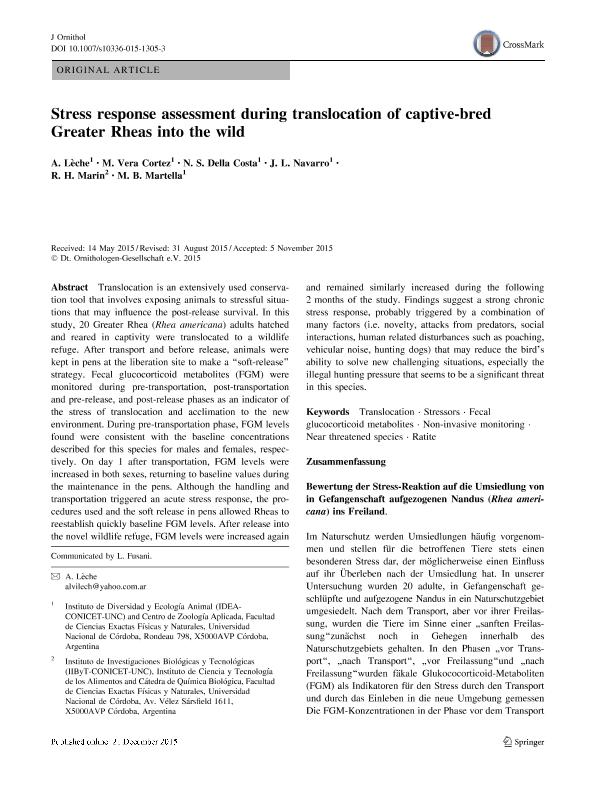Artículo
Stress response assessment during translocation of captive-bred Greater Rheas into the wild
Leche, Alvina ; Vera Cortez, Marilina
; Vera Cortez, Marilina ; Della Costa, Natalia Soledad
; Della Costa, Natalia Soledad ; Navarro, Joaquin Luis
; Navarro, Joaquin Luis ; Marin, Raul Hector
; Marin, Raul Hector ; Martella, Monica Beatriz
; Martella, Monica Beatriz
 ; Vera Cortez, Marilina
; Vera Cortez, Marilina ; Della Costa, Natalia Soledad
; Della Costa, Natalia Soledad ; Navarro, Joaquin Luis
; Navarro, Joaquin Luis ; Marin, Raul Hector
; Marin, Raul Hector ; Martella, Monica Beatriz
; Martella, Monica Beatriz
Fecha de publicación:
11/2015
Editorial:
Springer
Revista:
Journal of Ornithology
ISSN:
2193-7206
Idioma:
Inglés
Tipo de recurso:
Artículo publicado
Clasificación temática:
Resumen
Translocation is an extensively used conservationtool that involves exposing animals to stressful situationsthat may influence the post-release survival. In thisstudy, 20 Greater Rhea (Rhea americana) adults hatchedand reared in captivity were translocated to a wildliferefuge. After transport and before release, animals werekept in pens at the liberation site to make a ??soft-release??strategy. Fecal glucocorticoid metabolites (FGM) weremonitored during pre-transportation, post-transportationand pre-release, and post-release phases as an indicator ofthe stress of translocation and acclimation to the newenvironment. During pre-transportation phase, FGM levelsfound were consistent with the baseline concentrationsdescribed for this species for males and females, respectively.On day 1 after transportation, FGM levels wereincreased in both sexes, returning to baseline values duringthe maintenance in the pens. Although the handling andtransportation triggered an acute stress response, the proceduresused and the soft release in pens allowed Rheas toreestablish quickly baseline FGM levels. After release intothe novel wildlife refuge, FGM levels were increased again and remained similarly increased during the following2 months of the study. Findings suggest a strong chronicstress response, probably triggered by a combination ofmany factors (i.e. novelty, attacks from predators, socialinteractions, human related disturbances such as poaching,vehicular noise, hunting dogs) that may reduce the bird?sability to solve new challenging situations, especially theillegal hunting pressure that seems to be a significant threatin this species.
Archivos asociados
Licencia
Identificadores
Colecciones
Articulos(IDEA)
Articulos de INSTITUTO DE DIVERSIDAD Y ECOLOGIA ANIMAL
Articulos de INSTITUTO DE DIVERSIDAD Y ECOLOGIA ANIMAL
Citación
Leche, Alvina; Vera Cortez, Marilina; Della Costa, Natalia Soledad; Navarro, Joaquin Luis; Marin, Raul Hector; et al.; Stress response assessment during translocation of captive-bred Greater Rheas into the wild; Springer; Journal of Ornithology; 157; 2; 11-2015; 599-607
Compartir
Altmétricas



